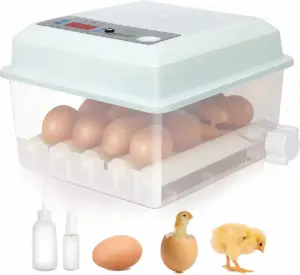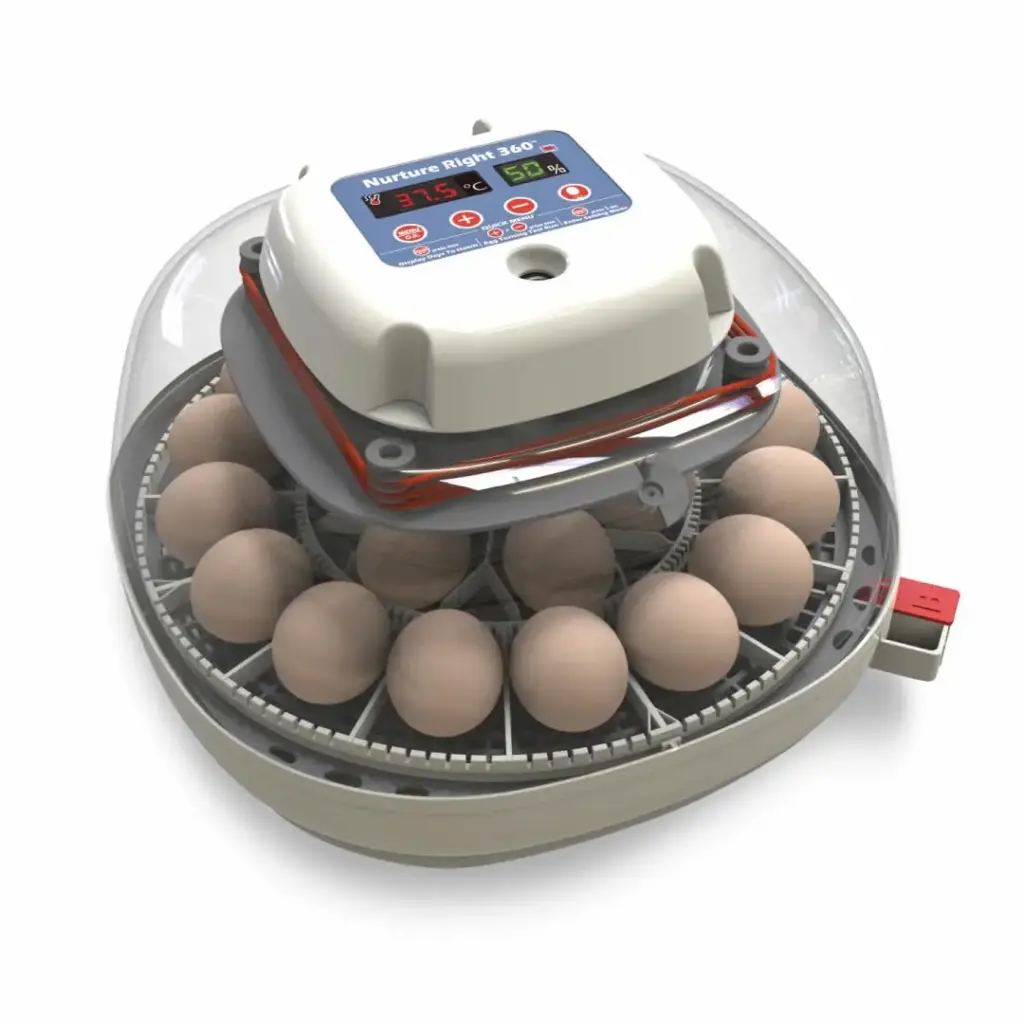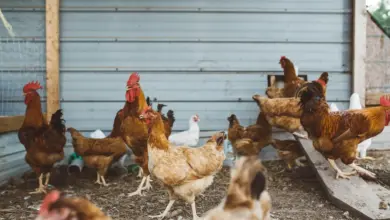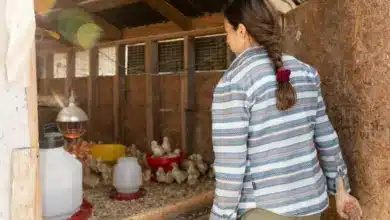The Best Egg Incubators For Chickens, Ducks, and Quails
Hatching eggs at home can be a fun project and it’s good for kids to learn how chickens are born and how the life cycle works. Having a chicken be born from an egg to chick in 21 days is a fun and exciting time! Read our reviews below to decide on the best incubator for you!
Best Overall Incubator
- The GCCSJ16 Egg Incubator is the #1 Overall Best Egg incubator.
- Quail, duck, chicken, goose, and geese eggs hatch at different rates and require different conditions.
- Incubators allow you to monitor incubation conditions and maximize the number eggs that hatch in a brood.
In the wild, quails, chickens and ducks will lay their eggs and then the female will incubate the eggs until they hatch. In captivity, it can be difficult to provide the animals with an appropriate nest. Many farmers now use egg incubators. Egg incubators can mimic natural nesting conditions and increase the chance of a successful hatch.
Incubation of quail eggs can be done in egg incubators, which are usually used for chicken and duck eggs. Incubators must be monitored carefully because each egg needs a different environment to thrive and grow. Egg incubators can help farmers ensure that their poultry hatches its eggs successfully.
Egg incubators come in many different types, but all of them serve the same function: they provide an environment controlled for the development of the eggs. By carefully controlling temperature and humidity, an incubator can provide the ideal conditions for a successful hatch.
Most incubators also have a feature that allows you to rotate the eggs frequently, which is crucial for proper development. If you are serious about hatching your eggs, an incubator is worth the investment. This article will help you choose the best incubator for your needs.
Table of Contents
Toggle
- GCCSJ 16 Egg Incubator
- Turner that turns your eggs automatically every 90 seconds
- No need to remove lid when adding water
- The built-in egg candler lets you check the fertility of the eggs and their progress.
- Manna Pro Harris Farms Nurture Right Incubator
- Clear top for observation
- Maintains temperature and air circulation
- 22-egg capacity
- Kebonnixs 12 Egg Incubator
- A great choice for the novice egg hatcher
- It’s easier to use an external water filler because you don’t need to open it in order to add water.
- Temperature control that is accurate and user-friendly
- Hethya 36 Egg Incubator
- The automatic egg function turns eggs every 90 seconds
- Five automatic modes to control geese and chickens
- It is large enough to be used as a wider
The Top Incubators For Chickens, Ducks and Quails
The GCCSJ 16 egg incubator is rated #1 in the world.
The GCCSJ16 Egg Incubator is our choice for the best egg incubator.
This incubator features an automatic device that rotates the eggs every 90 minute. If you want to increase the rate of turning, you can start the turner any time. The rollers can be adjusted to fit the size of different eggs, so it is suitable for duck, chicken, goose, and quail. This incubator also has an easy way to control temperature and humidity.
It is not necessary to remove the cap to add water. This is crucial for maintaining a constant temperature. The LED screen monitors temperature fluctuations and sends an alarm if the temperature drops or rises too much. It is great if you tend to forget things as you can check the eggs more often.
This set comes with an egg candler that allows you to monitor the progress of your eggs and check their fertility. You can attach the incubator to a battery if there is a power outage to keep your eggs alive. It supports a wide variety of eggs, so you have many options if you want to hatch different breeds.
The operating manual for this incubator was not very clear, and many reviewers had to figure it out themselves.
The GCCSJ16 Egg Incubator: The Good and The Not So Good
| The Good | The Not So Good |
| This incubator can be used for duck, chicken, goose, or quail eggs. | The instructions in the operating manual are vague. |
| The automatic turning device is included. | |
| Add water to the incubator from outside. | |
| The LED display allows you to monitor temperature changes. | |
| The unit can be powered by a 12V Battery or mains power, if necessary. | |
| The egg candler is built in. |
Enjoying our article? Read: The 8 Best Quality Chicken Brooders
Best Overall Egg Incubator
- Turner that turns your eggs automatically every 90 seconds
- No need to remove lid when adding water
- The built-in egg candler lets you check the fertility of the eggs and their progress.
2. The best incubator for ducks is the Manna Pro Harris Farms Incubator Nurture Right
We recommend the Manna Pro Harris Farms Incubator Nurture Right for duck eggs.
It’s useful to be able to observe the entire egg as it turns. It’s great for observation because it has a clear top. This is a great option for beginners or educators. The incubator has an induced airflow that helps to maintain the temperature and circulation of air.
Even inside the egg the chick needs oxygen, which is brought in through the shell. This model features an air vent at each corner of its base. This incubator has an automatic turn with auto-stop, which prevents the eggs from being turned three days before hatching. It is perfect for chickens and ducks.
It can hold 22 chicken eggs or 12 to 18 duck eggs. It works well for chicken eggs, but not turkey. The external water pot allows you to add more water to the incubator to maintain humidity. The temperature will remain the same inside the incubator if you add water from outside. In dry climates, adding water to most incubators would require you to remove the lid. This will let heat escape, decreasing hatch rate.
Some customers have reported a low hatching percentage with this incubator.
The Good and The Not So Good of the Manna Pro Harris Farms Incubator Nurture Right
| The Good | The Not So Good |
| The top of this incubator is transparent, so you can easily see the eggs. | Customers have reported a low hatching percentage with this incubator. |
| The airflow has been induced to provide optimal air circulation and temperature stabilization. | |
| Each corner of the base has an air vent. | |
| The auto-turning feature stops the turning three days before the hatching. | |
| This product is suitable for duck, chicken and pheasant egg. |
Also Read: The 5 Best Cheap Chicken Brooders
Best For Ducks
- Clear top for observation
- Maintains temperature and air circulation
- 22-egg capacity
3. Kebonnixs Egg Incubator 12 is the best for Quails
The Kebonnixs Egg Incubator is a good choice for hatching quail eggs. It’s also an excellent option for beginners because of its simple design.
The reviews indicate that it is a very successful incubator for quails. This incubator is perfect for novice egg hatchers to achieve high hatch rates. The incubator has 12 spots to place eggs. This is a great number for beginners, both for incubation and for raising chicks.
The incubator is designed to ensure oxygen and temperature are maintained by stabilizing airflow. It’s easier to use the external water filler because you don’t need to open it in order to add more water. There is also a built-in candler that allows you to monitor the development of the eggs.
The automatic egg turner rotates eggs every hour, and stops rotating them automatically three days before hatching date. The accurate temperature control makes it the easiest to use for beginners. The temperature is adjusted using a prediction method that uses three readings every second to track trends. It is the easiest incubator to use, making it an excellent choice for hatching your first eggs.
Some customers have reported that the bottom is very slippery and difficult for chicks when they are laying eggs.
Kebonnixs Egg Incubator 12: The Good and The Not So Good
| The Good | The Not So Good |
| This incubator can hold 12 eggs. | As chicks hatch, the bottom of the nest is slippery. |
| You can add water from outside the incubator. | |
| The eggs are automatically turned every hour, and then stopped automatically three days before they hatch. | |
| The egg-candler is built into the product. | |
| The system automatically adjusts temperatures by using a predictive system that tracks fluctuations based on 3 readings per second. |
The best Incubator for quails
- A great choice for the novice egg hatcher
- It’s easier to use an external water filler because you don’t need to open it in order to add water.
- Temperature control that is accurate and user-friendly
4. Hethya Egg Incubator 36 Eggs is the Best Choice for Geese
The Hethya Egg Incubator is a great choice for geese egg incubation.
The automatic egg function is a great option for hatching goose eggs. The automatic egg function turns eggs every 90 minutes. The roller distance can be adjusted according to the size of eggs you need to hatch. You can choose from five different automatic modes depending on the type of bird egg you want to hatch.
This helps to remove the guesswork from the incubation environment while providing optimal results. There is a backup solution for power outages. Attach a 12V Battery to the incubator and plug it into the wall. The battery will take over if the wall outlet is not working. It ensures that the temperature and humidity are maintained in any situation.
This setup prevents excessive water from being added. The overflow prevents it from affecting moisture. The temperature can be maintained by re-filling the water with the lid shut.
The only problem with this product is the vagueness of the instructions.
The Hethya Egg Incubator: The Good and The Not So Good
| The Good | The Not So Good |
| The incubator will automatically turn the eggs 90 minutes. | The instructions are vague. |
| The rollers can be adjusted to the desired distance depending on the size and shape of the egg. | |
| If required, it can be connected to a battery of 12V. | |
| Water can be added to the incubator from the outside. |
The Best for Geese
- The automatic egg function turns eggs every 90 seconds
- Five automatic modes to control geese and chickens
- It is large enough to be used as a wider
What to look for when choosing the best
Auto-turning, in addition to choosing the correct size incubator for your eggs, is essential because rotating the eggs frequently prevents the developing embryo from sticking to the shell. They can become fatal if they don’t turn. Their developing organs may attach to the shell. A sound alarm will help you monitor the condition of your incubator.
You won’t need to check on your incubator as often if the humidity or temperature levels are off. The better you can maintain the right levels in this controlled environment, your hatch rate will increase. If you lose power, or the cord is damaged, a backup power supply can ensure the eggs are kept in a safe and secure environment. Incubation of eggs is delicate and requires accuracy.
It may not be essential, but an incubator with a flashlight can be useful. You can only place the light on the bottom of the eggs, which may make it harder to see as precisely as with a regular flashlight. You can use the regular candler to shine light into the top of the eggs, which helps you check if the chick is about break the shell. If an egg takes longer to hatch, you may want to check the progress.
Compare the The Good and The Not So Good of different types of incubators
Let’s look at the three types of egg incubators. One of the most common and popular egg incubators is the forced-air incubator. A fan is used to distribute the warm air throughout the egg chamber. The heat can therefore be distributed evenly throughout the incubator, allowing for more eggs to be incubated at the same time.
In contrast to forced-air incubators, the still-air type egg incubator does not have air holes. The setup of still-air incubators is more difficult and complex. Positioning the eggs correctly is important because air circulation will be affected by the radiant heat.
Air incubators must also be set to 103F, or humidity and temperature irregularities can occur. In order to allow fresh air into still-air incubators, the hatching chambers must be opened four times a day. Convection is the final type of egg incubator.
Convectional incubators require ventilation openings on the top, sides and bottom of the incubator. These ventilation openings allow air to rise, and pull chilly air down from below. This allows the eggs to be evenly heated.
It is important to monitor the humidity in conventional egg incubators. The conventional egg incubator, on the other hand is easy to build at home using recycled materials. We’ll examine the advantages and disadvantages of each.
Forced-Air Incubator
| The Good | The Not So Good |
| It maintains a constant temperature. | This is a costly option. |
| The eggs are automatically turned. | |
| Beginners will find it easier to use. |
Still-Air Incubator
| The Good | The Not So Good |
| This is a great product for experienced hatchers. | Turn off the auto-turning feature manually. |
| This is a great tool for those who prefer a more practical approach. | It is necessary to open the window to let in fresh air. |
| The eggs are automatically turned. |
Conventional Incubators
| The Good | The Not So Good |
| The cost of the product is very low. | This is the hardest to use, as it takes more time to set up. |
| It is easy to make. | It has a low hatch rate. |
| Best for | Buy the Product |
| Best Overall | GCCSJ 16 Egg Incubator |
| Ducks are Best! | Manna Pro Harris Farms Incubator Nurture Right |
| Best for Quails | Kebonnixs 12 Egg Incubator |
| The Best for Geese | Hethya 36 Egg Incubator |
The Best Egg Incubators for Chickens, Ducks and Quails (Frequently Asked Question)
For how long can chickens continue to lay fertile egg after removing the rooster?
After removing the rooster, chicken eggs can stay fertile for three weeks. The eggs will then be infertile and unviable for hatching.
How soon after the chickens have laid eggs can I start incubation?
You can incubate the eggs for up to one week after hatching if your hen doesn’t lay on the hens. It is possible to hatch them a few days later, but the chances of success will decrease with each additional day. The temperature and how eggs were stored can also affect the hatching rate.
This post may contain affiliate links to our partners like Amazon, and others. Purchasing through these helps us further the Earth Life site to educate our readers.



